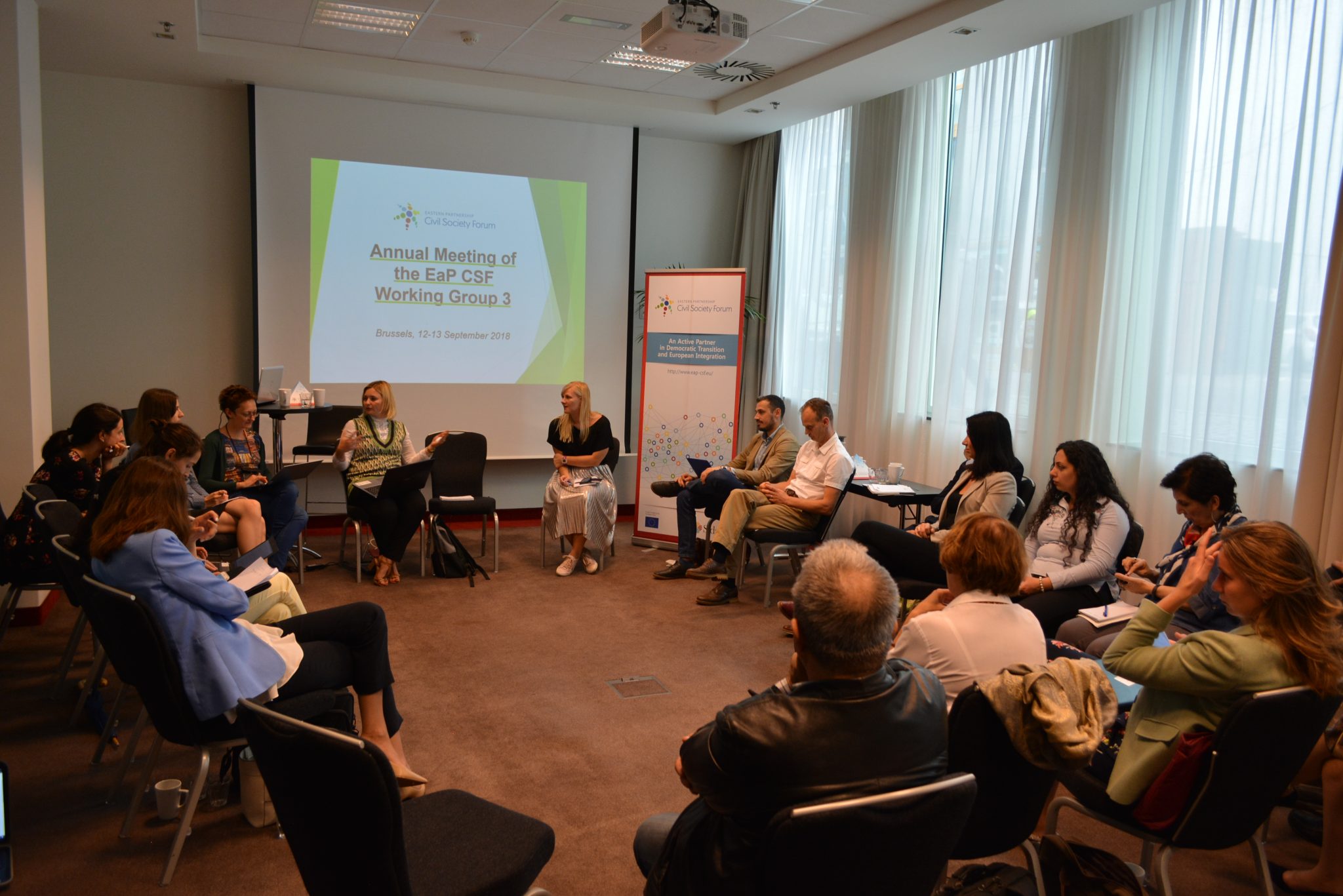Brussels, 12-13 September 2018
Working Group 3 Meeting 2018
EaP CSF Working Group 3 “Environment, climate change and energy security” met in Brussels to discuss new EaP architecture, Internal Reform and upcoming changes to the Forum. The Working Group also looked at specific issues affecting the EaP region.
The discussions gave way to a list of recommendations on topics such as environment, transport, energy and energy efficiency – which were presented to the EU stakeholders, invited to attend the meeting on the second day. Members also had a chance to attend a training session, aimed at improving communications skills and delivering messages to stakeholders.
Opening the meeting, WG3 Coordinators, Ina Coseru and Ana Otilia Nutu highlighted EaP CSF’s role in the new EaP architecture, particularly within EaP Platforms and Panels. The Internal Reform is a crucial step in realising its full potential. The proposed Code of Conduct, which generated some questions from the floor, will make new structure more transparent and accountable to members. Reporting from their home countries, members agreed that civil society is increasingly recognised as a stakeholder in discussion around environment, as shown by the experience of Belarus and Ukraine. Unfortunately, state agencies in the region more than often lack institutional power and resources.
Breaking into smaller group, the experts on environment addressed the Action Plan on Environment, taking place in each country – ahead of the Environmental Ministerial on 9 October. Further discussion dealt with raising public awareness, reforestation and nature protection, as well as the planned expansion of hydropower in Moldova and Ukraine. This gave rise to a number of recommendations:
- Better inclusion of EaP CSF in discussions on environment, with a way of monitoring the implementation of civil society recommendations – particularly by central authorities
- Ensuring that institutional reforms strengthen, rather than weaken, governance on environment – as seen in Georgia or Moldova
- Hydropower is not “green” – it should not attract international financial institutions’ (IFI) support or be eligible for green tariffs, and any new construction can only proceed with strict Environmental Impact Assessment (EIA)
- Develop Strategic Environmental Assessment (SEA) legislation and include national and international experts on projects, involving large scale construction – particularly, Amulsar goldmine in Armenia and Olmany marshes – Ramsar site in Belarus
Angela Bularga (Programme Manager for Environment, Growth, Better Governance, DG NEAR) welcomed the civil society component at the upcoming Ministerial meeting. Bularga was also keen to hear the group’s position on hydropower and suggested linking future EaP CSF re-granting projects to EU flagship projects.
The group on transport, on the other hand, discussed the state of play on the TEN-T network in each country, as well as the Road Safety Action Plan, which was addressed in Transport Panel on 18 September – coming up with a comprehensive list of recommendations:
- Stop the E-40 Waterway – for the sake of safety and inevitable loss of unique habitats, forests and agricultural land
- Improve the management and coordination of road safety – including establishing appropriately funded road safety agencies, with capacity to analyse, monitor and collect data
- Increase the capacity of low-carbon transport and road infrastructure – which includes freight and new technologies, such as biofuel, liquid natural gas and stations for electric vehicles
- Create a transparent and simplified mechanism, catering for electric vehicles – which will include regulations, incentives and programmes on restricting import of older vehicles, as well as scrapping and recycling
- Improve transport links to the South Caucasus – which also included a point on public transport and improving its provision, generally
Veronika Liskova (International Relations Officer at DG MOVE) and Antonio Nunez (Senior Transport Specialist at the World Bank) both concentrated their attention on road safety and were receptive of the group’s recommendations. Liskova acknowledged the area as a priority, especially in the context of changing road-user behaviour and education. Nunez added that the role of civil society is to guide decision-makers – does not only extend to road safety, but also issues such as decarbonisation and improvement of infrastructure.
The groups focusing on energy, and energy efficiency, discussed how renewable energy can be integrated into national and local legislation, as well as planning and programming. Their recommendations are:
- Strive for full implementation of market rules and regulations – with close monitoring and independent auditing, pushing for full transparency in the energy sector
- Address the energy deals which involve actors in the separatist regions, namely in Ukraine, Moldova and Georgia – to enforce good governance and fair competition
- Ensure that all energy projects attracting EU support fully respect EIA and SEA regulations – including the earlier-mentioned Dniester case in Moldova and Ukraine, as well as hydropower in Georgia
- Build capacity for energy efficiency in households and adopt a broad approach for energy poverty
Finally, Marion Schiller Probst (International Relations Officer at DG ENER) called for more transparency in the energy sector and addressed the group’s concerns around interconnectivity.
Closing the meeting, Ina Coseru and Ana Otilia Nutu looked at different ways of making future sessions more participatory. The expectation is that WG3 will grow to include 30 members in the upcoming cycle – doubling in size, meaning that it will need more capacity to continue its activities. The debate will be taken up again at the 10th Annual Assembly in Tbilisi, Georgia (10-12 December 2018).
Available for download
- Presentation: WG3 Meeting, Brussels, 12-13 September 2018
- Presentation: 2018 Internal Reform
- Video Recording: 2018 Internal Reform Presentation by WG3 Coordinators Ina Coseru and Ana Otilia Nutu
- Photo Gallery: WG3 Meeting, Brussels, 12-13 September 2018



